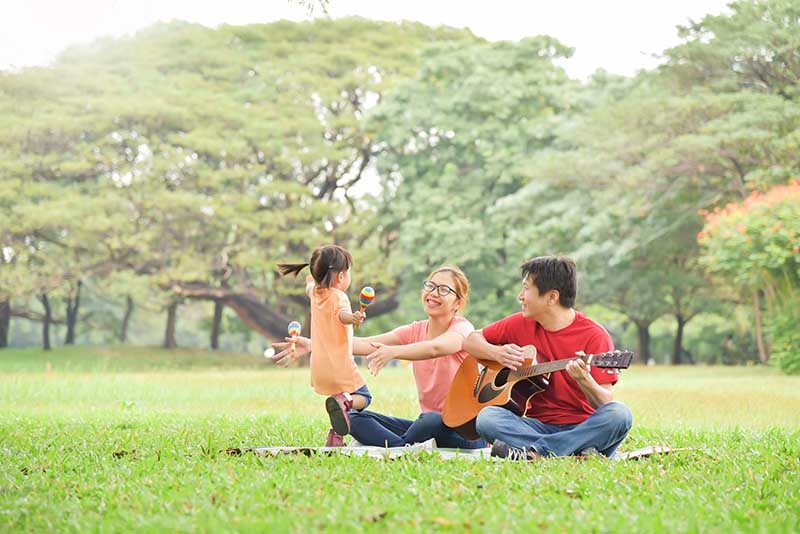Families For Life | Relationships and Child Development

Key points
A loving, stable and responsive relationship with you is fundamental to your child’s development.
Through relationships, children learn how to think, understand, communicate, behave, show emotions and develop social skills.
Playing with your child strengthens your relationship and encourages your child to explore, observe, experiment and solve problems.
Why loving, nurturing relationships are important
Children’s relationships shape the way they see the world and affect all areas of their development. Through relationships, children learn about their world.
That’s because relationships let children express themselves – a cry, a laugh, a question – and get something back – a cuddle, a smile, an answer. What children ‘get back’ gives them very important information about what the world is like and how to act in the world – how to think, understand, communicate, behave, show emotions and develop social skills.
For example, it’s natural for your baby to want to communicate with you through babbling, facial expressions and gestures like waving, nodding and shaking her head. It’s good when you respond with the same kind of ‘talking’ and gesturing, because this shows warmth and love. By responding in a warm, loving and gentle way, you’re helping your baby learn about communication, behaviour and emotions.
You’re also making your child feel safe and secure, and building a strong relationship between you and him. When your child feels safe and attached to you, he’s likely to have the confidence to explore his world. That’s because he knows you’re there to support, encourage and share new experiences with him.
Your child’s most important early relationships are with you, other family members and carers.
Exploring the world gives your child new experiences. Your child needs the stimulation of these experiences to learn how to think, communicate, react and socialise. The more experiences he has with you there to support him, the more he grows and thrives.
Your relationships with others
It’s not just the relationship between you and your child that shapes his development. It’s also your relationships with others. Your child sees how you behave and communicate with other people in your life – for example, your partner, family members, friends and carers.
This shows your child how to interact and behave with others and how other people will behave in return. If your child sees and copies kind and respectful relationships, he’ll learn to act this way in his relationships with others.
Why play is important
In the early years, your child’s main way of learning and developing is through play.
Play is fun for your child and gives him an opportunity to explore, observe, experiment, solve problems and learn from his mistakes. He needs your support and encouragement to do this. It’s important to try to find a balance between helping him and letting him make mistakes, because finding out for himself about the world is a big part of learning.
Lots of time spent playing, talking, listening and interacting with you helps your child learn the skills he needs for life, like communicating, thinking, solving problems, moving and being with other people and children.
However, more than this, play is a great relationship builder. Spending time playing with your child sends a simple message – you’re important to me. This message helps your child learn about who he is and where he fits in the world.
Play and relationships in action: The peekaboo example
A simple game of peekaboo is a great example of how relationships, play and time together help with all areas of a baby’s development.
When you play peekaboo with your baby, you hide your face behind your hands and pop out again. Your baby probably reaches out his arms, giggles and smiles. It’s your baby’s way of saying, ‘Keep playing – this is fun!’ You keep going, and your baby is happy. However, after a while, your baby might look away. That’s his way of saying he’s had enough play for now. You know it’s time to take a break.
This peekaboo example shows that your baby wants to play with you, which means he’s attached to you. And attachment is a sign of healthy social and emotional development.
Also, when your baby squeals and reaches out his arms to say he wants more play, he’s developing his language and motor skills. When you respond, it encourages him to keep communicating with you.
Peekaboo helps with your baby’s thinking too, as he learns about what comes next when you disappear and then reappear.
When you respond to your baby’s cues for more play or for a break, your baby understands that he can trust you. This helps him feel safe, loved and secure - and feeling safe gives him confidence to explore the world.
It’s just a simple game of peekaboo, but it’s laying the foundation for the baby’s language, thinking, motor skills, and social and emotional development. This is only possible because of the positive, nurturing relationship between you and your baby.
Relationships: Benefits for life
Warm and loving interactions between you and your child develop your child’s confidence, resilience and communication. This prepares your child for things he’ll come across later in life, like working through problems, dealing with stress and forming healthy relationships with other people in adolescence and adulthood.
Strong attachments and relationships early in life also mean your child is more likely to have better mental health and fewer behavioural problems.
By building a warm, positive and responsive relationship with your child, you’re helping shape the adult he’ll become and giving him a strong foundation for the rest of his life.
© raisingchildren.net.au, translated and adapted with permission
Explore more